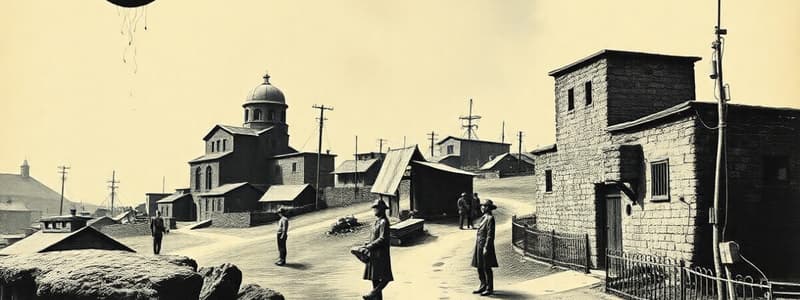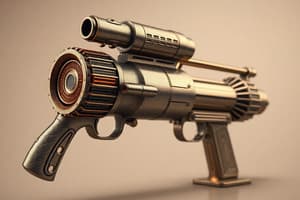Podcast
Questions and Answers
What factor contributes to smaller particles initiating sintering at lower temperatures?
What factor contributes to smaller particles initiating sintering at lower temperatures?
- Greater driving force for necking and consolidation (correct)
- Higher melting points of smaller particles
- Decreased diffusion rates with temperature
- Larger particle sizes causing obstruction
How does temperature affect the diffusion rate in the sintering process?
How does temperature affect the diffusion rate in the sintering process?
- Diffusion rate exponentially increases with temperature (correct)
- Diffusion rate remains constant regardless of temperature
- Diffusion rate decreases as temperature approaches melting
- Diffusion rate increases linearly with temperature
What is a secondary effect of sintering on a build?
What is a secondary effect of sintering on a build?
- Reduced particle size over time
- Full densification of the powder bed
- Thermally-induced fusing of cross-sectional geometry (correct)
- Sintering occurs without any temperature change
What does the Arrhenius equation primarily relate to?
What does the Arrhenius equation primarily relate to?
What is a common result of rapid fusion of a powder bed?
What is a common result of rapid fusion of a powder bed?
What is the first Powder Bed Fusion (PBF) process that was commercialized?
What is the first Powder Bed Fusion (PBF) process that was commercialized?
Which of the following is NOT a type of powder fusion mechanism?
Which of the following is NOT a type of powder fusion mechanism?
What type of materials can be used in Powder Bed Fusion processes?
What type of materials can be used in Powder Bed Fusion processes?
What is one of the main challenges regarding powder handling in PBF processes?
What is one of the main challenges regarding powder handling in PBF processes?
Which technology is associated with the polymer laser sintering process?
Which technology is associated with the polymer laser sintering process?
What role does molten constituent play in LPS during powder processing?
What role does molten constituent play in LPS during powder processing?
Which material is most commonly used in PBF processing for achieving high density structures?
Which material is most commonly used in PBF processing for achieving high density structures?
What type of materials are typically subjected to full melting in PBF processing?
What type of materials are typically subjected to full melting in PBF processing?
What happens to the thermal energy during subsequent scans in full melting processes?
What happens to the thermal energy during subsequent scans in full melting processes?
In traditional powder metallurgy, what is the role of Co in cemented carbide tools?
In traditional powder metallurgy, what is the role of Co in cemented carbide tools?
Which thermal sources can be used in Powder Bed Fusion processes?
Which thermal sources can be used in Powder Bed Fusion processes?
What is the purpose of the counter rotating powder leveling roller in the pLS process?
What is the purpose of the counter rotating powder leveling roller in the pLS process?
What is maintained in the build chamber during the pLS process to minimize oxidation?
What is maintained in the build chamber during the pLS process to minimize oxidation?
Which type of polymer is commonly used in Powder Bed Fusion processes?
Which type of polymer is commonly used in Powder Bed Fusion processes?
What describes the layer thickness in the pLS process?
What describes the layer thickness in the pLS process?
What are ceramics generally described as?
What are ceramics generally described as?
What happens after each layer is completed in the pLS process?
What happens after each layer is completed in the pLS process?
Which of the following materials are commonly processed in PBF?
Which of the following materials are commonly processed in PBF?
What is the primary purpose of contour mode during scanning?
What is the primary purpose of contour mode during scanning?
What is used to fuse the material in the pLS process?
What is used to fuse the material in the pLS process?
Why is a cool-down typically required after completing the part in pLS?
Why is a cool-down typically required after completing the part in pLS?
What is a characteristic of an effective powder delivery system in PBF?
What is a characteristic of an effective powder delivery system in PBF?
What occurs during fill mode when scanning?
What occurs during fill mode when scanning?
Which factor is NOT a universal characteristic of powder feeding?
Which factor is NOT a universal characteristic of powder feeding?
What happens as particle size decreases during powder handling?
What happens as particle size decreases during powder handling?
Why is overweight particle handling discouraged in powder delivery systems?
Why is overweight particle handling discouraged in powder delivery systems?
What is a consequence of increasing the surface area to volume ratio of a powder particle?
What is a consequence of increasing the surface area to volume ratio of a powder particle?
What scanning mode ensures precision in surface finish around the edges of the part?
What scanning mode ensures precision in surface finish around the edges of the part?
Flashcards are hidden until you start studying
Study Notes
Powder Bed Fusion Processes
- PBF processes were among the first commercialized AM processes.
- Selective Laser Sintering (SLS) is the first PBF process to be commercialized.
- All PBF processes share a common set of characteristics:
- Thermal sources for inducing fusion between powder particles.
- Controlled powder fusion to a prescribed region of each layer.
- Mechanisms for adding and smoothing powder layers.
- PBF processes are increasingly used for direct digital manufacturing of end-use products.
- PBF processes use lasers, electron beams, and other thermal sources for sintering.
pLS Process
- pLS is a paradigm approach for PBF processes.
- pLS fuses thin layers of powder, typically 0.075 - 0.1 mm thick.
- The pLS process takes place in an enclosed chamber filled with nitrogen gas.
- CO2 laser is used to thermally fuse the material to form the slice cross-section.
- After completing a layer, the build platform is lowered by one layer thickness, and a new layer of powder is laid and leveled.
- The process repeats until the part is built.
- A cool-down is typically required to allow the parts to uniformly come to a low enough temperature that can be handled.
Materials
- Polymers:
- Thermoplastic or thermoset.
- Thermoplastic:
- Amorphous polymers have a random molecular structure.
- Crystalline polymers have a regular molecular structure.
- Commonly used in PBF: Thermoplastic polymer - commonly known as nylon.
- Metals and composites:
- Types of steel used include stainless steels and tool steels.
- Titanium and its alloys, nickel-based alloys, some aluminum alloys, and cobalt-chromium are also used.
- Ceramics and ceramic composites:
- Ceramic materials are generally described as compounds that consist of metal oxides, carbides, and nitrides and their combinations.
- Smaller particles experience a greater driving force for necking and consolidation, thus smaller particles sinter more rapidly and initiate sintering at lower temperatures than larger particles.
- As the diffusion rate exponentially increases with temperature, sintering becomes increasingly rapid as temperatures approach the melting temperature.
- There are three secondary ways sintering affects a build:
- The loose powder within the build platform will begin to sinter to one another if held at an elevated temperature.
- Thermally-induced fusing of the desired cross-sectional geometry causes that region of the powder bed to become much hotter than the surrounding loose powder.
- Rapid fusion of a powder bed using a laser or other heat source rarely results in 100% dense, porosity-free parts.
Liquid-Phase Sintering (LPS)
- LPS is a term used in powder processing to refer to the fusion of powder particles when a portion of constituents within a collection of powder particles becomes molten.
- The molten constituents act as the glue which binds the solid particles together.
- LPS is used in traditional powder metallurgy to form, for instance, cemented carbide cutting tools where Co is used as the lower-melting-point constituent to glue together particles of WC.
Full Melting
- Full melting is most commonly associated with PBF processing of engineering metal alloys and semi-crystalline polymers.
- Thermal energy of subsequent scans of a laser or electron beam is typically sufficient to re-melt a portion of the previously solidified solid-structure.
- Scanning often occurs in two modes, contour mode and fill mode:
- Contour mode scans the outline of the part cross-section for a particular layer, typically for accuracy and surface finish reasons around the perimeter.
- Fill mode scans the rest of the cross-section.
Powder Handling
- Powder handling challenges:
- Various systems for powder delivery in PBF have been developed.
- Any powder delivery system for PBF must meet at least four characteristics:
- A powder reservoir of sufficient volume to build to the maximum build height.
- Transporting the correct volume of powder from the powder reservoir to the build platform.
- The powder must be spread to form a smooth, thin, repeatable layer of powder.
- The powder spreading must not create excessive shear forces that disturb the previously processed layers.
- There are universal characteristics of powder feeding:
- As particle size decreases, interparticle friction and electrostatic forces increase.
- When the surface area to volume ratio of the particle increases, its surface energy increases and becomes more reactive.
- Small particles have a tendency to become airborne and float as a cloud of particles when handled.
- Smaller powder particle sizes enable better surface finish, higher accuracy, and thinner layers.
- Various types of powder feeding systems are used in PBF.
Studying That Suits You
Use AI to generate personalized quizzes and flashcards to suit your learning preferences.




